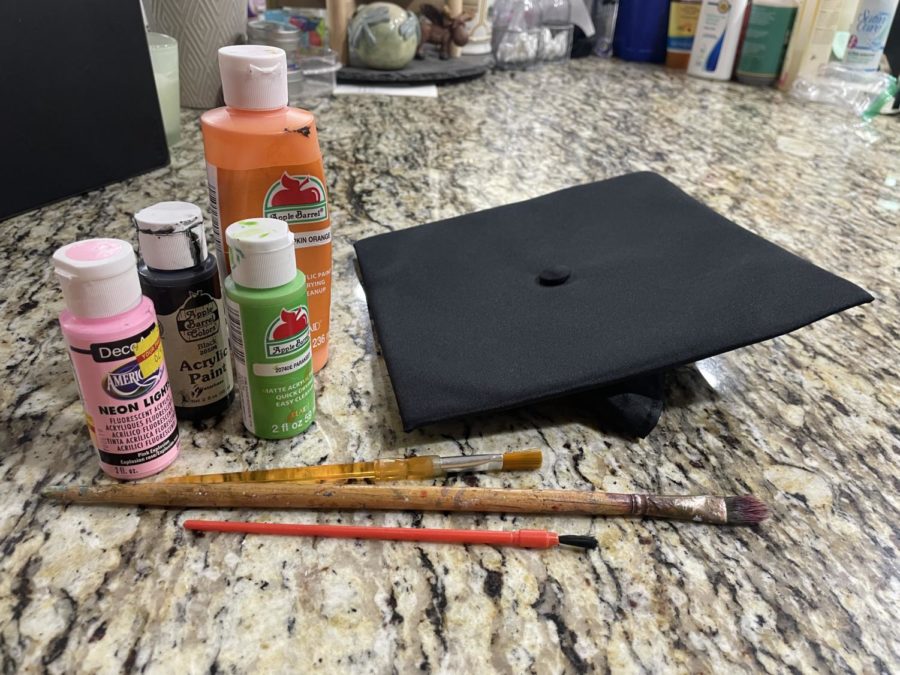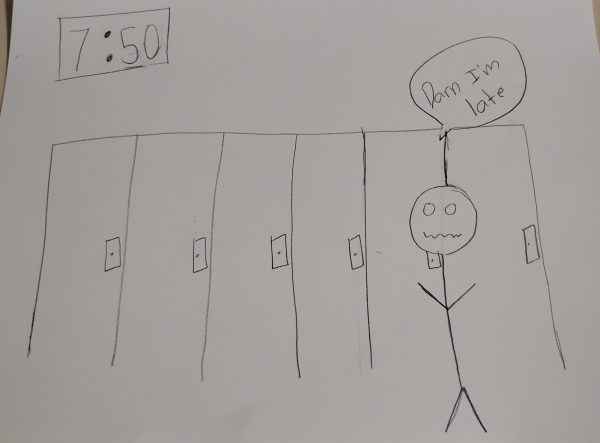Graduation procedure prohibits decorated caps
Photo by Savannah Athy-Sedbrook
Art supplies sit near an empty graduation cap. Currently, students are not allowed to wear decorated caps to the formal graduation ceremony.
The band blares the commencement song as graduates walk to their seats, giddy with joy at the opportunity to finally walk across the stage and receive their diplomas.
Graduation ceremonies mark the end of high school and is the last school event for seniors.
“Graduation is different than a lot of other events that we have at the high school because it’s a formal ceremony; we want our students to look uniform,” principal Rick Rivera said. “It’s our ceremony to recognize our graduates, and part of that is making sure that it all looks uniform.”
The procedure regarding graduation caps, which has been followed since at least 1998, states students may not decorate their caps in any way.
“Students should definitely be able to decorate; it’s our last chance to make a final impression on people and be able to express ourselves and our interest is important for that,” senior Jacob Dieter said. “Most parents also only show up to support their child; they aren’t interested in what we are wearing, but what we accomplished.”
Not every student agrees with the current procedure in place.
“I get if you’re borrowing it or renting it from the school, maybe no, but if I’m buying it with my own money and it’s going to be mine, why not be able to decorate it?” senior Keelynn Barnett said. “It’s something unique; it makes you stand out.”
Students are allowed to have a decorated cap for outside-of-school events; however, they cannot have one for the official ceremony.
“I would say that they’re free to have one decorated, and they can take all their pictures and do all the things that they would want,” Rivera said, “but this [procedure] would be the appropriate thing to do for our ceremony.”

If a student takes a decorated cap to the ceremony, they will be asked to leave it in their vehicle and borrow one from the school instead.
Senior Trinity Guffey understands how all graduates looking the same can create unity; however, she believes the rule is too limiting.
“This is a public school, and one of the really big things with public school is being individual and showing that individuality through your creativity and through different representations of your personality,” senior Trinity Guffey said. “I think not being allowed to decorate your cap is taking that away.”
Rivera does think there’s a reason Augusta continues the historical precedent of undecorated caps and looking uniform.
“It’s important that students recognize that there’s a time and place to do certain things and a time and place where formality is appropriate,” Rivera said.
An Oriole newspaper survey of 157 students from all grade levels showed that 151 students agreed seniors should be able to decorate their caps to use for the official ceremony, two said seniors should not be allowed to wear decorated caps and four had no preference.
“It’s just a nice little fun knick-knack that they can do with their caps,” senior David Ebenkamp said. “It’s nothing huge, but I still think that it’s a little ridiculous that we’re not allowed to do it. It’s only a small portion of the graduation.”

Senior Trinity Tisdale proposed a compromise to the existing rule.
“A big compromise I could see is getting it decorated and then [Rivera] okaying it before we actually do it,” Tisdale said. “Then if it doesn’t, we can’t wear it. He should have to accept what your cap looks like.”
Students suggested a new cap decorating policy could include a color scheme, type of materials or a designated theme such as the graduates’ future plans.
“I think that would be a nice compromise because people could put inappropriate logos or make it way too flashy that it takes away from the other graduates that didn’t decorate theirs,” Ebenkamp said. “The worst thing that could happen is a bad design on the hat, but that can be mitigated if the principal just approved or denied cap designs.”
According to Rivera, graduation does not follow a normal dress code, so it should not have to fall on administrators to determine what should and should not be approved. Continuing the historical precedent of dress for graduation avoids the issue altogether.
“They think it’s because we’re taking something away from them or they have a right to do this, and I think part of education is telling you that things aren’t always going to be what you want,” Rivera said. “Sometimes, it’s not because I don’t like you or I don’t like your design, it’s you have to learn that this is what’s appropriate for this event.”
If students have questions or comments, Rivera is open to talking to them.
“I’m always willing to listen to students,” Rivera said. “We can always have conversations, and, when we have those conversations, it gives me an opportunity to explain the reasoning behind the policy. This is a formal ceremony honoring our graduates, and we need to treat it as such. There is a time for the individuality, but perhaps a graduation ceremony is not that place.”
Whether it is decorating caps or participating in other senior-specific activities, graduation is an important day to students and staff.
“It’s a really big achievement to graduate high school,” Tisdale said. “The ceremony should be for us, after all, we are the ones who went through the grueling 12 years of schooling for the title of a graduate.”

Senior Savannah Athy-Sedbrook is a fourth-year reporter for The Oriole. She can often be found running around during ace to complete stories, as well as...














